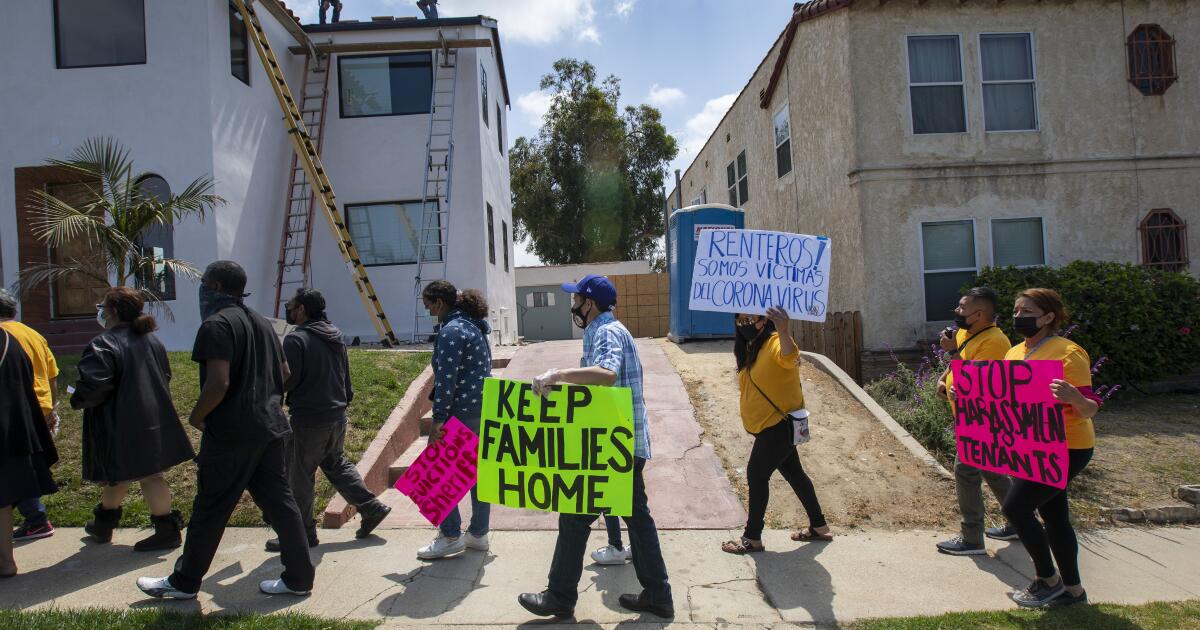When lawyers show up in Los Angeles County courtrooms prepared to fight eviction proceedings, they typically stand next to the landlord.
That could change if county supervisors approve a “right to counsel” ordinance that would connect struggling renters with lawyers in unincorporated areas of Los Angeles County that are home to 1 million residents. Supervisors voted Tuesday to move forward with the plan, but they must approve it again before it becomes law.
They praised the plan as a way to change the dynamic between landlords who are knowledgeable about housing law and tenants who aren’t.
Supervisor Holly Mitchell, who introduced the proposal last year with Supervisor Hilda Solis, said she believes legal aid is out of reach for too many tenants.
Landlords have attorneys in 88% of eviction cases in Los Angeles County, compared with 3% for tenants, according to a 2019 analysis produced by the Los Angeles Right to Counsel Coalition, which advocates for policies similar to those proposed by the supervisors.
Supervisor Katherine Burger, who has criticized recent county policies as overly favorable to renters, called the proposal “balanced.”
Tenant advocates say the status quo gives landlords the upper hand in court and dooms tenants to lose their homes. More than a dozen jurisdictions, including New York City, San Francisco and Philadelphia, have passed right-to-counsel laws in recent years.
Los Angeles County is poised to join in. If the ordinance passes the vote again, it would take effect in early 2025 and apply to renters making less than 80% of the area median income, which equates to about $110,000 for a family of four.
But landlord groups argue that the majority of cases before the courts don’t stem from landlords’ misunderstandings of the law and therefore only postpone inevitable evictions. In most cases, tenants are there because they’re deeply behind on their rent payments.
“At the end of the day, it doesn’t do anything,” said Daniel Yukelson, executive director of the Apartment Association of Greater Los Angeles. “It just makes home prices go up because landlords have to pay the costs of these lengthy legal processes.”
The program will cost about $21 million in its first year, according to a county report. County officials will contract with nonprofit legal aid groups to provide the lawyers.
Many of the tenants who supported the policy on Tuesday complained to authorities that they were at risk of losing their homes for unpaid rent. One tenant said her rent jumped from $800 to $3,000 after an investor bought the property. A South Los Angeles woman fought back tears as she said she had been living in her car for 18 months with her family and dog because she had no money. A 51-year-old woman said she was a month behind on her rent and, as an undocumented immigrant, couldn’t find steady work to pay back the rent.
The three women, speaking in Spanish through an interpreter, said research shows Latino and black renters are most likely to be evicted in Los Angeles County.
Some landlord advocacy groups say the money used to hire lawyers would be better spent by helping tenants pay their overdue rent.
“Hiring taxpayer-funded lawyers for tenants who don’t pay rent won’t stop evictions,” said Joshua Howard of the California Apartment Association. “Those funds would be better spent providing rental assistance so eviction proceedings don’t start.”
County Consumer and Business Affairs Director Rafael Carbajal told supervisors that his department has provided about $46 million to landlords through the rent relief program.
Supporters of the proposal say that even if a tenant is facing eviction for unpaid rent, a persuasive lawyer could negotiate lower rents, allowing the tenant to stay in their home longer — or, in a best-case scenario, stop the eviction altogether.
“I’ve seen what happens when tenants don’t understand the eviction process,” said housing expert Angela Birdsong, who said she knows a young man who found a lawyer and avoided eviction from his Skid Row home.
The county currently provides legal services for at-risk tenants through its Stay Housed Los Angeles program, and this ordinance would make those services permanent, as long as funding is available.
The amount of funding to permanently pay for those services was left unresolved at Tuesday’s meeting.
County officials plan to fund the program with federal pandemic relief funds in the first year, and after that, they hope to raise money from a half-cent homeless sales tax that will be on the November ballot, Mitchell said.

